The shadow economy can generally be defined as economic activities (labour, goods produced, and services rendered) that are conducted in non-compliance with applicable laws, for the purpose of avoiding taxes or/and regulations. In order to effectively counteract the shadow economy, it should not just be viewed as a source of criminal offences. It is important to recognize that the shadow economy is primarily concerned with value creation. This suggests that the fight against the shadow economy is at its most effective not when illegitimate activities are completely eradicated, but when they are transformed from the unofficial to official domain. In order for this to occur, one should consider the legal environment in which economic activities are carried out. Is it conducive to working and doing business? Incentives to participate in the shadow economy always stem from restrictions on legal economic activities, be they taxes or regulations. The primary way to curb the shadow economy, therefore, is to create a favourable legal environment for economic activity.
Unfolding Drivers of Illegal Trade through Cross-Country Micro-Analysis (2017-2019)
To shed more light on the extent and drivers of the shadow economy, in 2017 the Lithuanian Free Market Institute started a project Unfolding Drivers of Illegal Trade through Cross-Country Micro-Analysis which explores the size and public perceptions of the shadow economy and engagement in illicit activities, including illegal trade in excise goods and undeclared labour in Lithuania, Latvia, Estonia, Poland, Sweden, and the Czech Republic. The project addresses the root causes of illegal trade and undeclared labour in the selected countries through representative population surveys, cross-country policy assessment, and an in-depth quantitative econometric micro-analysis on the effects of specific drivers of the shadow economy on the level of illegal economic activity.
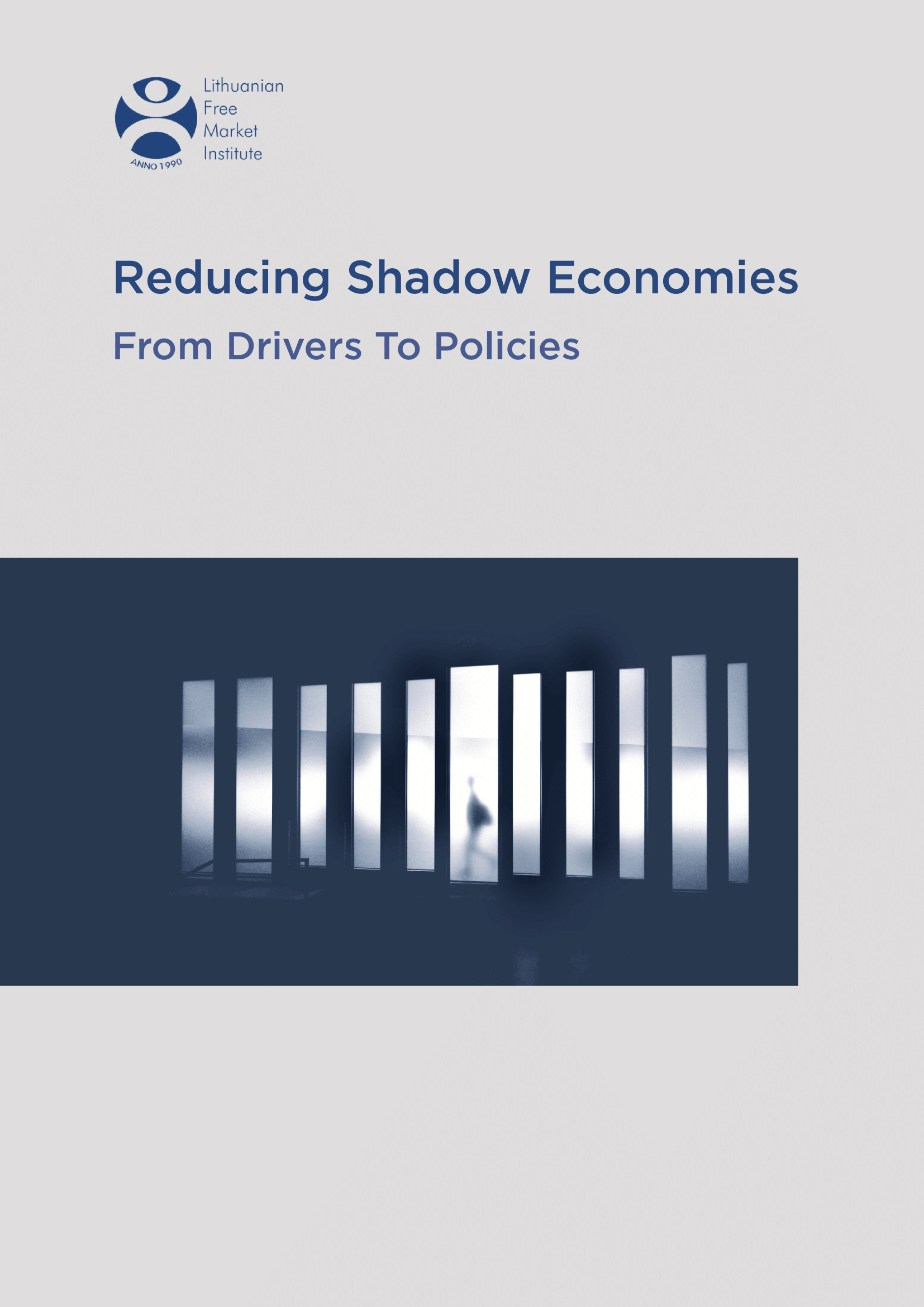 |
Reducing Shadow Economies. From Drivers to Policies (2019) research report from the Lithuanian Free Market Institute analyses the shadow economies in Lithuania, Latvia, Estonia, Poland, Sweden and the Czech Republic, provides new evidence on taxes and regulations as the primary causes of the shadow economies as well as other significant factors that come at play and affect the extent to which taxes and regulations determine the prevalence of undeclared or illicit activities. The research suggests that robust tendencies exist in relation to these factors. The income level, justification of the shadow economy and the perceived severity of punishment are among the robustly significant drivers across all of the countries analysed. The perceived likelihood of being detected is only significant for the undeclared labor market.
In our research we employed a direct (micro), survey-based approach to investigating the shadow economy and regression analysis of the individual data from the surveys to identify its significant drivers. The surveys of public perception and engagement in the shadow economy were conducted in Lithuania, Latvia, Estonia, Poland, Sweden and the Czech Republic during March and April 2018. |
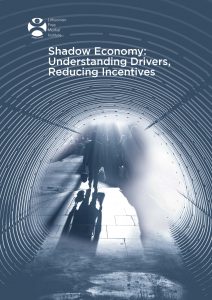 |
Shadow Economy: Understanding Drivers, Reducing Incentives (2018) presents and analyses the results of representative population surveys into public perceptions of the shadow economy and engagement in illicit activities in Lithuania, Latvia, Estonia, Poland, Sweden and the Czech Republic. The publication focuses on the most important factors of the shadow economy, including public attitude towards governments and its services, public attitude towards the shadow economy and tax morale, the severity of punishment for engaging in illicit economic activity and the likelihood of being detected, and people’s income and the affordability of goods and services.
For the purposes of this research, representative population surveys were carried out between March and April 2018 by Spinter Research, surveying a total of 6,055 individuals aged 18-75 in Lithuania, Latvia, Estonia, Poland, the Czech Republic and Sweden.
The study will be followed by an in-depth research report on the drivers of the shadow economy together with extensive policy recommendations for the said countries in Autumn 2019. |
This research is funded by PMI Impact, a grant award initiative of Philip Morris International (PMI). The views and opinions expressed in this article and the research reports are those of the Lithuanian Free Market Institute (LFMI) and do not necessarily reflect the views of PMI. In the performance of its research, LFMI maintains full independence from PMI. Responsibility for the information and views expressed in this article and research reports lies entirely with LFMI.
Conference. Understanding the Shadow Economy (2018)
On November 15th, 2018 the Lithuanian Free Market Institute held a conference on the shadow economy in Vilnius to address the scope and drivers of the shadow economy in Lithuania and across Europe and to discuss the most effective policies in tackling the issue.
What are the major driving forces behind the shadow economy? What government policies aimed at reducing the shadow economy should we expect in the future? Are those policies effective? What are the alternatives? The conference provided a unique platform for the exchange of ideas between NGOs, government institutions, law enforcement agencies, and businesses.
The event featured a presentation on the drivers of the shadow economy by Vytautas Žukauskas, head of shadow economy research at the Lithuanian Free Market Institute and a presentation on the scope of the shadow economy and Lithuania’s policies aimed at fighting the issue by Vilius Šapoka, the Minister of Finance of Lithuania. The conference also featured a panel discussion with Lukas Savickas, Advisor to the Prime Minister, Audrius Misevičius, Deputy Auditor General, Daiva Čibirienė, representative of the Small and Medium-sized Business Council, Darius Dulskis, partner at “Economic Consultancy and Research”, and representatives of the Lithuanian Free Market Institute. The discussants addressed the scope of the shadow economy in Lithuania and the country’s policies aimed at reducing undeclared labour, illicit trade in excise goods, and shadow goods and services markets.
The event gathered 66 high-profile officials from major government institutions, including the Ministry of Finance, the Customs Department, the Financial Crime Investigation Service, the Criminal Policy Bureau, the Police Department, the State Tax Inspectorate, the State Border Guard Service, as well as representatives of chambers of commerce, business associations, commercial banks, politicians, and the media.
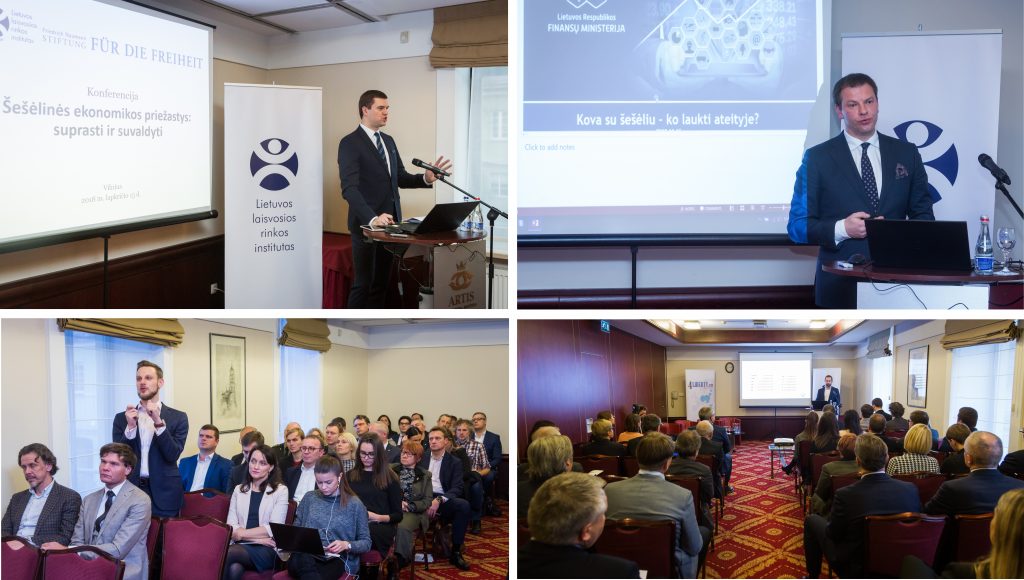
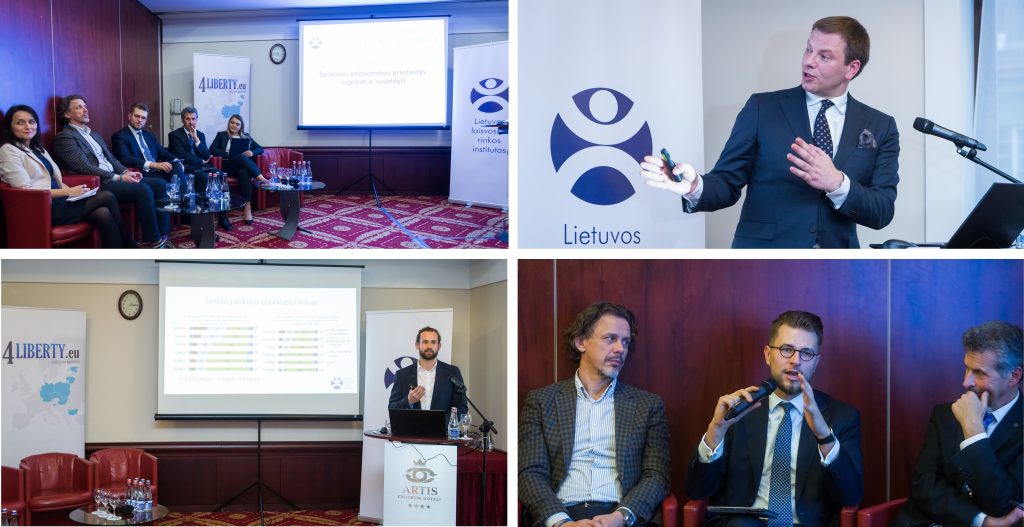
The conference was organised under the Lithuanian Free Market Institute’s More Liberal Voices project supported by a grant from the Friedrich Naumann Foundation for Freedom.
Shadow economies in the Baltic Sea Region: Unfolding Composition, Cases and Consequences (2015)
In 2015 the Lithuanian Free Market Institute in cooperation with dr. Friedrich Schneider of Johannes Kepler University Linz, the Civil Development Forum FOR, Poland, the Belarussian Institute for Strategic Studies, Arnis Sauka of the Stockholm School of Economics in Riga, Timbro, Sweden, and the Mises Institute, Estonia carried out the project Shadow economies in the Baltic Sea Region: Unfolding Composition, Cases and Consequences. The goal of the project was to unfold and analyze the composition, causes and consequences of the shadow economies in Lithuania, Latvia, Estonia, Poland, Sweden and Belarus and to draw policy recommendations for tackling the shadow economies in the respective countries.
The project involved representative population surveys on public perceptions of the shadow economy and actual engagement in shadow economic activities that was conducted in six countries, including Lithuania, Latvia, Estonia, Poland, Sweden and Belarus May 22nd until June 15th of 2015 by Spinter Research. The target audience included 18 to 75-year-old residents, with a total sample size consisting of 6,035 in all six countries. The surveys were carried out based on the CAWI (Computer Assisted Web Interview) method using a standardized questionnaire. The survey data and other sources of evidence were used to investigate the drivers of the shadow economy and to draw policy recommendations. A research publication Shadow economies in the Baltic Sea Region 2015 was published.
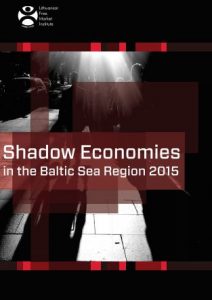 |
Shadow Economies in the Baltic Sea Region (2015) analyses the results of representative population surveys on public perceptions of the shadow economy and actual engagement in shadow economic activities in Lithuania, Latvia, Estonia, Poland, Sweden and Belarus, investigates the drivers of the shadow economy and draws policy recommendations on tackling the issue.
The publication was released on November 11th, 2015 in an international conference Screening Shadow Economies: From Causes to Policy Strategies in Vilnius, Lithuania. |
Lithuanian Shadow Economy (2012-2014)
Lithuanian Shadow Economy was an annual publication of the Lithuanian Free Market Institute devoted to the shadow economy in Lithuania, issued from 2012 through 2014. The 2012 issue explored the illegal market of excise goods in Lithuania, the second issue (2013) focused on undeclared labour, and the 2014 publication was dedicated to the root causes of the shadow economy and policy recommendations for tackling the issue.